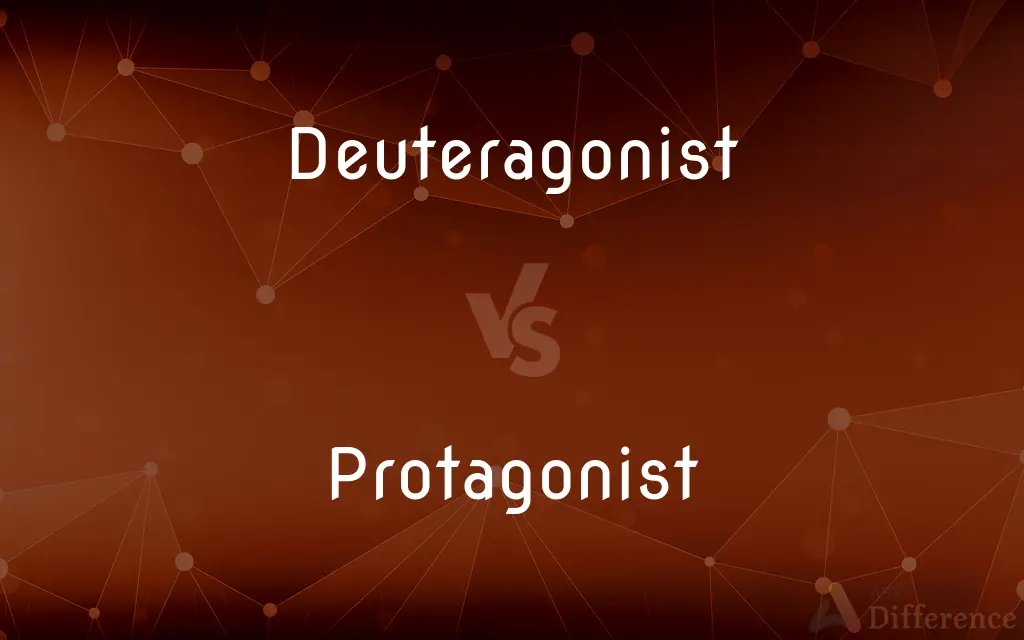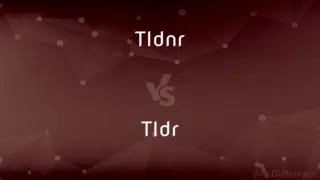Deuteragonist vs. Protagonist — What's the Difference?
By Tayyaba Rehman & Fiza Rafique — Updated on April 8, 2024
The deuteragonist plays a secondary role to the protagonist's central narrative, often providing support or contrast.

Difference Between Deuteragonist and Protagonist
Table of Contents
ADVERTISEMENT
Key Differences
The protagonist is the main character around whom the story revolves, facing conflicts and undergoing development. On the other hand, the deuteragonist, though central, plays a supportive or contrasting role to the protagonist, enhancing the narrative depth.
While protagonists often undergo significant transformation or face major challenges, deuteragonists complement this journey, offering a different perspective or aiding in the protagonist's development. For example, in many stories, the protagonist's actions drive the plot forward, whereas the deuteragonist may provide critical support, face their own challenges, or sometimes even oppose the protagonist, adding complexity to the narrative.
The protagonist is typically the character with whom the audience is meant to identify most closely, while the deuteragonist's role, though crucial, is designed to enrich the protagonist’s storyline rather than being the focal point of audience empathy.
In terms of narrative importance, the protagonist is usually the character whose decisions and actions are most pivotal to the story's outcome, while the deuteragonist plays a key role in influencing or reacting to these decisions. Finally, the relationship between the protagonist and deuteragonist can vary widely across narratives, from close allies to fierce rivals, each dynamic offering unique opportunities for character development and thematic exploration.
Comparison Chart
Role in the Story
Central character, the story revolves around them
Second most important character, supports or contrasts the protagonist
ADVERTISEMENT
Character Development
Undergoes significant transformation or faces major challenges
May also develop but often in relation to the protagonist’s journey
Relationship with Plot
Drives the story forward with their decisions and actions
Influences or reacts to the protagonist's decisions, enhancing the narrative
Audience Identification
Primary focus for audience empathy
Offers a different perspective, enriching the protagonist’s storyline
Dynamic with Protagonist
NA
Can vary from close ally to rival, affecting both characters’ development
Compare with Definitions
Deuteragonist
Drives the plot with their decisions and actions.
Frodo Baggins in The Lord of the Rings decides to destroy the Ring.
Protagonist
The second most important character, supporting or contrasting the protagonist.
Hermione Granger in Harry Potter provides crucial support to Harry.
Deuteragonist
Essential to the narrative’s outcome; without them, the story would be vastly different.
Without Katniss Everdeen, the Hunger Games would lack its revolutionary spark.
Protagonist
Often has a close relationship with the protagonist, offering support or conflict.
Dr. Watson in Sherlock Holmes stories provides a contrast to Holmes.
Deuteragonist
The main character in a story, facing the central conflict and undergoing transformation.
In Harry Potter, Harry is the protagonist who battles Voldemort.
Protagonist
While crucial, their actions are designed to support or enrich the protagonist’s story.
Mercutio in Romeo and Juliet adds depth to Romeo's character and the story.
Deuteragonist
Often experiences significant growth or change.
Elizabeth Bennet in Pride and Prejudice learns about her prejudices.
Protagonist
Enhances the narrative by providing a different perspective or complicating the plot.
Ron Weasley offers a different viewpoint and additional conflicts in Harry Potter.
Deuteragonist
Primary focus for audience empathy and identification.
Simba in The Lion King evokes audience empathy as he grows.
Protagonist
May undergo personal growth, though it often highlights the protagonist’s journey.
Samwise Gamgee in The Lord of the Rings shows loyalty and courage, underscoring Frodo’s quest.
Deuteragonist
In literature, the deuteragonist or secondary main character (from Ancient Greek: δευτεραγωνιστής, deuteragōnistḗs, second actor) is the second most important character, after the protagonist and before the tritagonist. The deuteragonist often acts as a constant companion to the protagonist or someone who continues actively aiding a protagonist.
Protagonist
A protagonist (from Ancient Greek πρωταγωνιστής, prōtagōnistḗs 'one who plays the first part, chief actor') is the main character of a story. The protagonist makes key decisions that affect the plot, primarily influencing the story and propelling it forward and is often the character who faces the most significant obstacles.
Deuteragonist
The character second in importance to the protagonist in classical Greek drama. See Usage Note at protagonist.
Protagonist
The main character in a work of fiction, as a play, film, or novel.
Deuteragonist
(narratology) A secondary character; specifically, the second most important character (after the protagonist).
Protagonist
In ancient Greek drama, the first actor to engage in dialogue with the chorus, in later dramas playing the main character and some minor characters as well.
Deuteragonist
An actor playing a role (potentially all roles) requiring a second actor to be present on the stage, opposite the protagonist.
Protagonist
A leading or principal figure.
Protagonist
The leader of a cause; a champion.
Protagonist
Usage Problem A proponent; an advocate.
Protagonist
(authorship) The main character, or one of the main characters, in any story, such as a literary work or drama.
Protagonist
A leading person in a contest; a principal performer.
Protagonist
(proscribed) An advocate or champion of a cause or course of action.
Protagonist
One who takes the leading part in a drama; hence, one who takes lead in some great scene, enterprise, conflict, or the like.
Shakespeare, the protagonist on the great of modern poetry.
Protagonist
A person who backs a politician or a team etc.;
All their supporters came out for the game
They are friends of the library
Protagonist
The principal character in a work of fiction
Common Curiosities
What is a protagonist?
The protagonist is the main character in a story, often facing conflict and experiencing significant growth.
Why is a deuteragonist important in a story?
A deuteragonist adds depth to the narrative, offering alternative perspectives or challenges that enrich the story.
How does a deuteragonist differ from an antagonist?
Unlike an antagonist who opposes the protagonist, a deuteragonist supports or complements the protagonist’s journey.
Can a story have multiple protagonists or deuteragonists?
Yes, stories can feature multiple protagonists or deuteragonists, especially in ensemble casts or complex narratives.
Is the deuteragonist always the protagonist’s friend?
Not always; the deuteragonist can be a friend, family member, rival, or even an enemy under certain circumstances.
Can a protagonist be villainous?
Yes, protagonists can be morally grey or villainous, especially in stories that explore complex themes of morality.
What’s the difference between a deuteragonist and a sidekick?
While a deuteragonist has a significant role in the narrative’s development, a sidekick primarily provides support without substantial impact on the plot.
Who is considered a deuteragonist?
The deuteragonist is the second most important character in a narrative, supporting or contrasting the protagonist.
Can the role of a deuteragonist change to a protagonist?
In some narratives, a deuteragonist’s role can evolve into that of a protagonist, especially in series or sequels.
How do audiences respond to deuteragonists?
Audiences may feel strong empathy for deuteragonists, especially when their stories are compelling and intricately linked to the protagonist’s journey.
Do deuteragonists always have their own subplots?
Often, but not always. When they do, these subplots usually intertwine with or enhance the main plot.
What makes a protagonist relatable?
Protagonists are often relatable due to their flaws, struggles, growth, and the universal themes they embody.
Can the protagonist and deuteragonist switch roles throughout the story?
While not common, role reversals can occur, especially in dynamic and evolving storylines where characters face changing circumstances.
How do authors develop deuteragonists?
Authors develop deuteragonists by giving them distinct personalities, goals, and character arcs that complement the protagonist.
How does a deuteragonist influence the protagonist?
Through support, conflict, or contrast, deuteragonists often influence the protagonist’s decisions, growth, or understanding of themselves.
Share Your Discovery

Previous Comparison
Tldnr vs. Tldr
Next Comparison
Teacher vs. MentorAuthor Spotlight
Written by
Tayyaba RehmanTayyaba Rehman is a distinguished writer, currently serving as a primary contributor to askdifference.com. As a researcher in semantics and etymology, Tayyaba's passion for the complexity of languages and their distinctions has found a perfect home on the platform. Tayyaba delves into the intricacies of language, distinguishing between commonly confused words and phrases, thereby providing clarity for readers worldwide.
Co-written by
Fiza RafiqueFiza Rafique is a skilled content writer at AskDifference.com, where she meticulously refines and enhances written pieces. Drawing from her vast editorial expertise, Fiza ensures clarity, accuracy, and precision in every article. Passionate about language, she continually seeks to elevate the quality of content for readers worldwide.














































